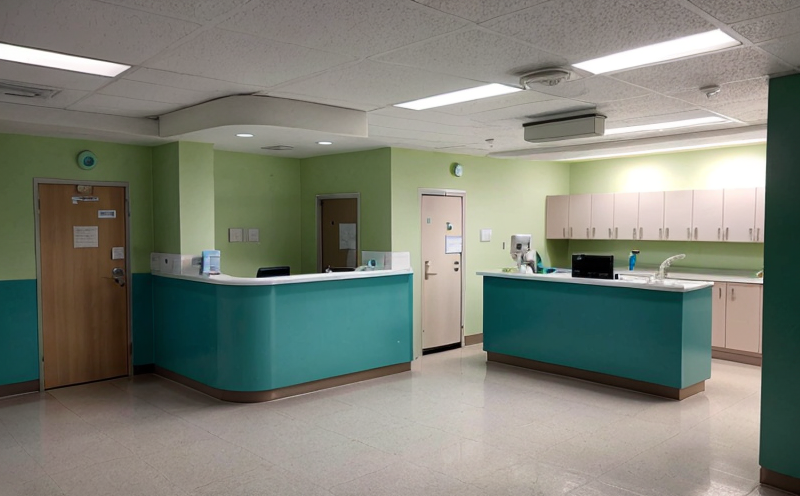USP Endotoxin Testing of Injectable Hospital Products
The USP Pharmacopeia United States Chapter 85: Detection of Pyrogens and Endotoxins in Pharmaceutical Products sets stringent standards for the testing of endotoxins in injectable pharmaceuticals used in hospital environments. This service is critical to ensure that medical products are safe for patient use, preventing adverse reactions such as fever or septic shock.
In hospitals and healthcare settings, the administration of injectables can pose significant risks if they contain even trace amounts of endotoxins derived from bacterial contamination. Endotoxins are part of the cell wall structure of Gram-negative bacteria and can trigger a strong immune response in patients. The presence of these toxins in injectable products like intravenous fluids or medications can lead to life-threatening conditions.
USP Chapter 85 specifies the use of the Limulus Amebocyte Lysate (LAL) test as the primary method for detecting endotoxins. This test utilizes a natural reagent derived from horseshoe crab blood, which reacts with endotoxins to produce a visible clotting reaction. The sensitivity of this test can detect even minute quantities of endotoxin, making it indispensable in the quality control process.
The testing procedure involves several critical steps:
- Sample preparation: Ensuring that any sample is free from interfering substances before testing to avoid false positives or negatives.
- Incubation and clotting: The Limulus Amebocyte Lysate reagent is added to the test sample, which undergoes a specific incubation period. If endotoxins are present, they will activate the coagulation cascade leading to visible clot formation.
- Measurement of reaction time: The time taken for the clotting reaction to occur is measured and compared against established standards.
The USP test is not only a regulatory requirement but also an essential tool in safeguarding patient safety. Hospitals must comply with these stringent standards, especially given that injectable products are administered directly into the bloodstream without any preliminary processing or digestion.
In summary, the USP Endotoxin Testing of Injectable Hospital Products is a cornerstone of pharmaceutical quality assurance, particularly in the healthcare sector where patient safety is paramount. By adhering to these standards, healthcare providers can ensure that only safe and effective products reach their patients.
Why It Matters
The significance of USP testing in the hospital environment cannot be overstated. The potential for endotoxin contamination poses a serious risk to patient health, particularly among vulnerable populations like elderly patients or those with compromised immune systems.
The Limulus Amebocyte Lysate (LAL) test used in USP Chapter 85 is highly sensitive and reliable, capable of detecting even trace amounts of endotoxins. This sensitivity ensures that only the purest injectable products are administered to patients, minimizing the risk of adverse reactions.
In addition to patient safety, compliance with these standards is also crucial for regulatory adherence. Non-compliance can result in product recalls and severe penalties, affecting both the reputation and profitability of pharmaceutical companies.
The testing process not only protects individual patients but also contributes to public health by maintaining a high standard of injectable medication quality across all healthcare facilities.
Benefits
- Enhanced Patient Safety: By ensuring that injectables are free from endotoxins, the USP testing process minimizes the risk of severe adverse reactions and helps maintain a high standard in healthcare.
- Regulatory Compliance: Adherence to USP standards ensures compliance with international regulatory requirements, avoiding potential legal issues and penalties.
- Quality Assurance: The rigorous testing process guarantees the quality of injectable products, ensuring they meet the highest industry standards.
- Patient Trust: Hospitals and pharmaceutical companies that adhere to these stringent testing protocols build trust with their patients, enhancing overall patient satisfaction.
- Risk Mitigation: By eliminating potential risks associated with endotoxin contamination, healthcare providers can mitigate the risk of adverse events and improve patient outcomes.
Eurolab Advantages
Eurolab stands out as a premier provider of USP endotoxin testing services, offering unparalleled expertise and state-of-the-art facilities. Our team of highly qualified professionals ensures that every test is conducted with the utmost precision and accuracy.
We utilize advanced instrumentation and reagents to deliver reliable results in compliance with international standards such as USP, ISO, and ICH guidelines. Our commitment to quality is reflected in our consistent accuracy rates and timely turnaround times.
Eurolab’s extensive experience and comprehensive understanding of the testing process allow us to provide personalized solutions tailored to the specific needs of our clients. Whether you require routine testing or specialized services for complex samples, we are here to support your quality assurance efforts.
Our facilities are equipped with cutting-edge technology and methodologies, ensuring that every test is conducted under controlled conditions. This not only enhances the reliability of results but also ensures consistency across all samples tested.





